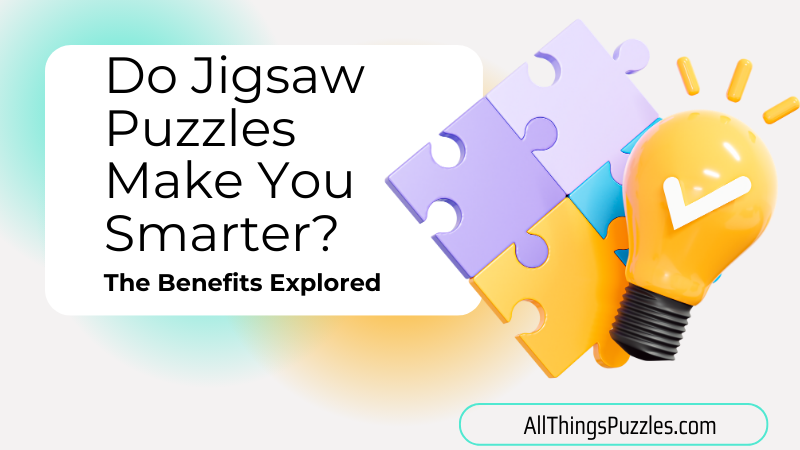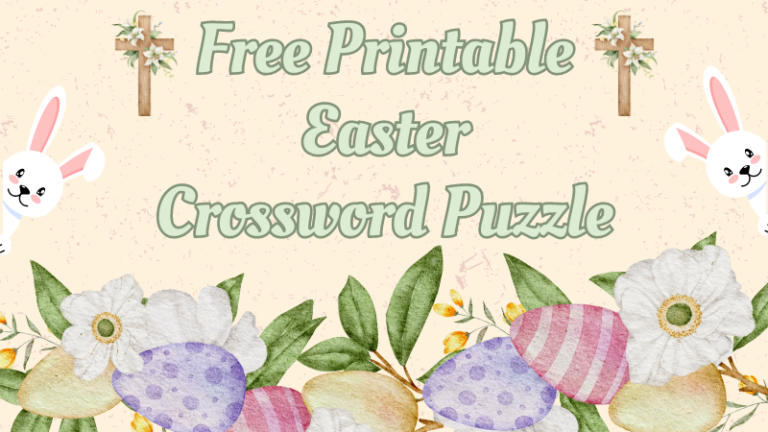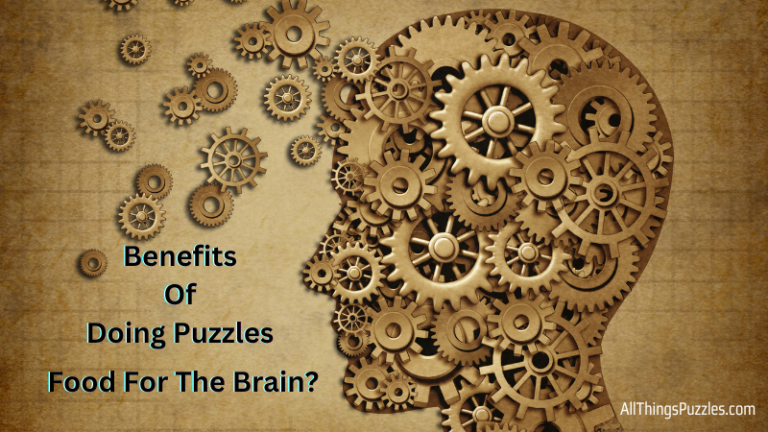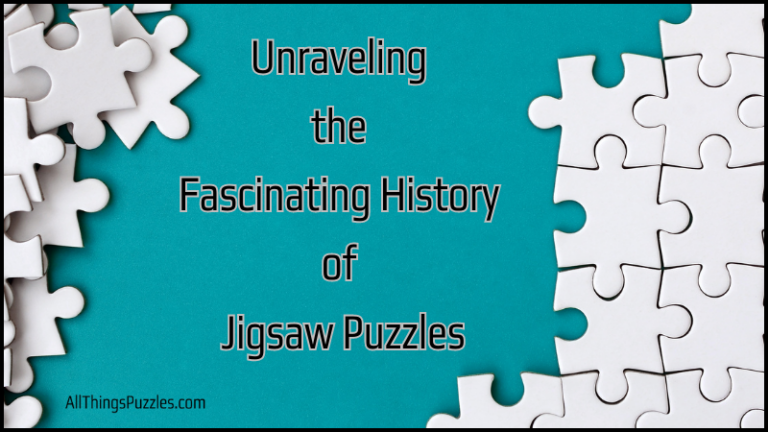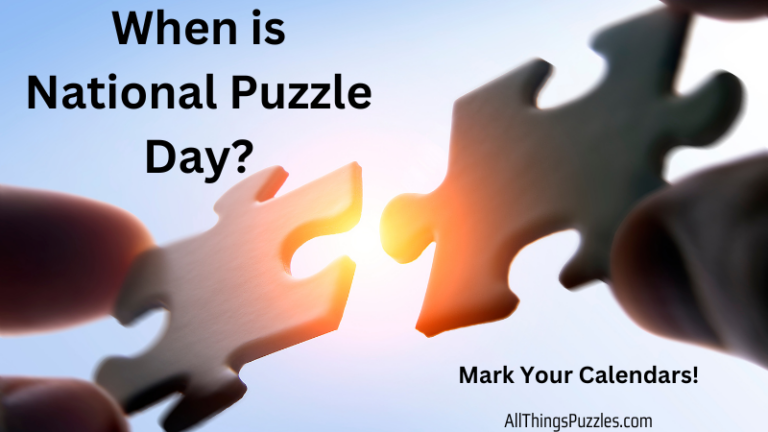Join us as we investigate the science behind jigsaw puzzles and discover whether they are not only a source of entertainment but also a tool for sharpening our minds and fostering a sense of accomplishment. Whether you’re a seasoned puzzler or someone curious about the cognitive benefits of this beloved pastime, prepare to embark on a journey of discovery as we unravel the mysteries and answer the question, do jigsaw puzzles make you smarter?
In the age of digital distractions and rapid information consumption, finding activities that engage our minds in meaningful ways is becoming increasingly valuable. Jigsaw puzzles, once relegated to quiet Sunday afternoons or family gatherings, are experiencing a resurgence in popularity as people seek out pastimes that offer both relaxation and cognitive stimulation. But beyond their nostalgic charm, do jigsaw puzzles actually confer any tangible benefits to our brains?
In this exploration, we delve into the fascinating world of jigsaw puzzles to uncover whether they truly have the power to enhance cognitive abilities, improve problem-solving skills, and even promote emotional well-being. From the neurological mechanisms at play to the psychological effects of piecing together intricate designs, we unravel the puzzle of whether this timeless activity holds the key to unlocking our intellectual potential.
Key Takeaways:
- Jigsaw puzzles offer cognitive benefits such as improved problem-solving abilities and are a complete brain exercise.
- Regular engagement with puzzles can lead to a healthier brain and may reduce the risk of cognitive decline and memory loss.
- People of all ages can enjoy and gain the psychological, emotional, and mental health benefits of integrating puzzles into their lives.
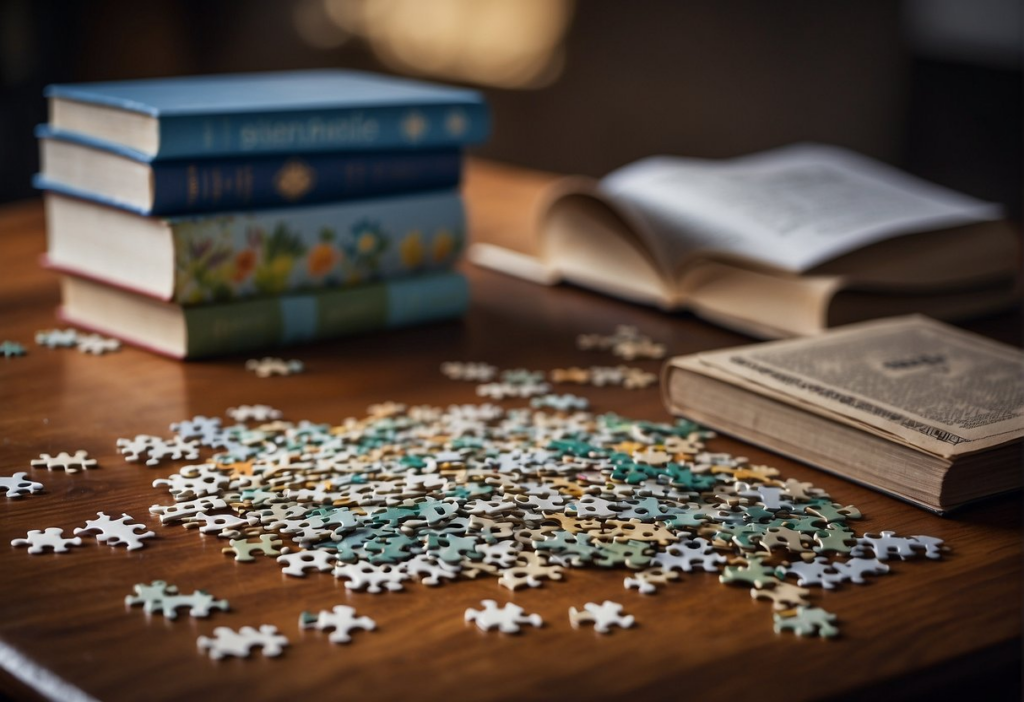
Engaging with jigsaw puzzles is a great way to enhance various aspects of cognitive function including problem-solving skills and short-term memory. Working on puzzles requires the integration of puzzle pieces, engaging cognitive skills, and exercising both sides of your brain.
- Mental Agility: Keeping your mind active can contribute to mental health and may stimulate brain cells to support critical thinking.
- Cognitive Health: Regular puzzling may slow cognitive decline and maintain mental speed, potentially impacting the onset of Alzheimer’s disease.
By consistently engaging with jigsaw puzzles, stress levels could be lowered, akin to the calming effects of crossword puzzles and other brain games. This activity improves hand-eye coordination and provides a sense of accomplishment which may lead to lowered blood pressure and a relaxed heart rate.
- Neural Growth: Assembling jigsaw puzzles can create new neural connections and increase attention span and problem-solving abilities.
- Memory Care: They are also beneficial for older adults, helping to combat memory loss and contributing to care for Alzheimer’s patients through visual-spatial reasoning and enhanced logical reasoning.
The sides of your brain, specifically the left brain, focus on logical reasoning, and the right brain, related to creativity, are both engaged when puzzling. This activity can induce an alpha state in your brain, fostering relaxation and mental agility. The benefits of jigsaw puzzles on brain function make it a complete brain exercise known to benefit people of all ages.
Cognitive Benefits of Jigsaw Puzzles

Jigsaw puzzles are a complete brain exercise that offers numerous cognitive benefits. Apart from improving cognitive function, they also provide a mental workout that can enhance problem-solving skills and preserve cognitive health.
Enhancement of Problem-Solving Skills
Jigsaw puzzling demands focused attentional demands as you ascertain the right pieces and fit them together. This activity is a great way to develop critical thinking and reasoning. When you work on puzzle pieces, both the logical reasoning of your left brain and the creative side of your right brain are engaged, encouraging the use of different approaches to problem-solving.
Impact on Memory and Cognition
Regular engagement with jigsaw puzzles can be a protective factor against memory loss and cognitive decline. The activity boosts short-term memory as you must recall shapes and colors and envision where pieces fit within the larger picture. Dr. Susanne Jäggi, from the University of Michigan, suggests that such brain games may even lead to improvements in IQ scores.
Stimulation of Brain Health and Function
Jigsaw puzzles are a fun challenge that keeps your mind active. This can lead to increased dopamine production, which is associated with optimism and a sense of accomplishment, contributing to lower stress levels and blood pressure. Further, studies imply that puzzles can enhance mental speed, hand-eye coordination, and strengthen neural connections, all vital elements for sustaining brain health.
Correlation Between Puzzles and IQ
While engaging in jigsaw puzzles is a healthy activity for people of all ages, it’s particularly beneficial for older adults. Not only do these puzzles act as a leisure activity, but they also contribute to better brain function through their focused attentional demands and visual-spatial reasoning requirements. While puzzles are not the only determinants of intelligence, they are an excellent way to maintain mental agility and could have a positive association with IQ.
Psychological and Emotional Advantages
Jigsaw puzzles are more than just a leisure activity; they are a great way to enhance cognitive function and promote psychological well-being. They can significantly benefit your mood and mental health.
Stress Reduction and Mood Improvement
Working on jigsaw puzzles can lead to stress levels decreasing as they require your complete, focused attention, often bringing you into a meditative state. This process reduces your heart rate and blood pressure, inducing relaxation. It’s much like giving your brain a short break, which is essential for maintaining long-term well-being. As you place the right puzzle pieces together, your brain releases dopamine, a neurotransmitter that enhances your mood and pleasure, providing a sense of accomplishment.
Enhancement of Concentration and Focus
Puzzles demand a high level of concentration and focus, enhancing these cognitive skills as you search for similar pieces and think about different approaches to the puzzle at hand. Engaging in this form of mental exercise regularly is associated with an increased attention span and can even serve as a protective factor against cognitive decline and memory loss, much like crossword puzzles and other brain games.
Fostering Creativity and Mindfulness
By embracing the bigger picture and the little details of the puzzle, you engage in visual-spatial reasoning, fostering a sense of mindfulness akin to meditation. This creative process not only keeps your mind active but also enhances your problem-solving abilities and mental agility, making jigsaw puzzles an excellent way to keep your brain health in check for people of all ages.
Physical and Social Aspects of Puzzling
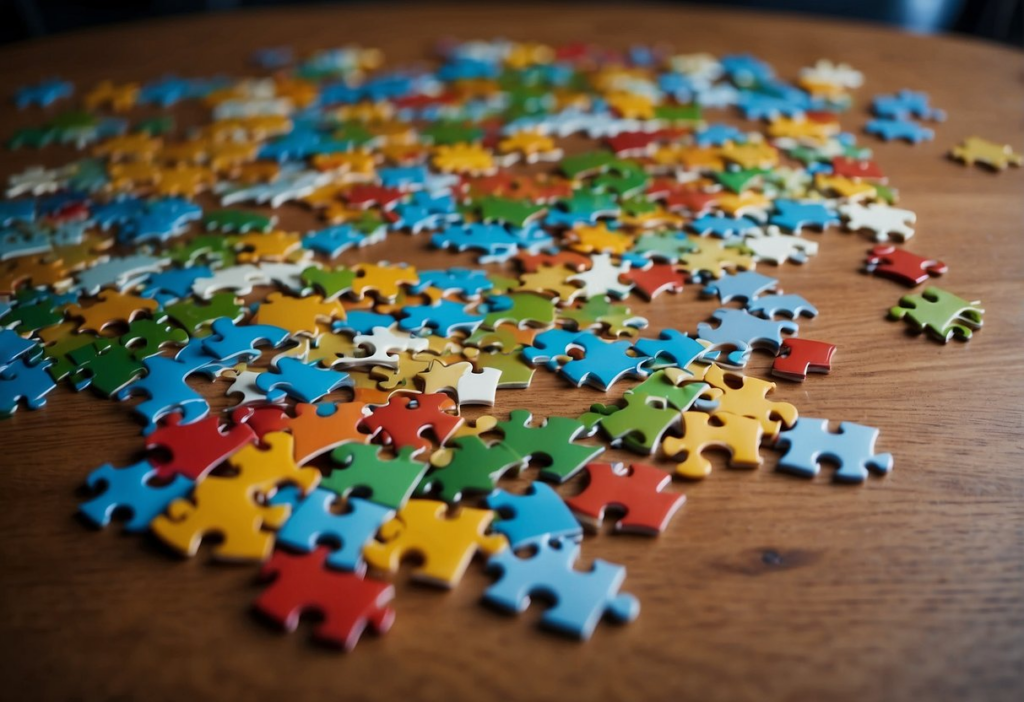
Jigsaw puzzles are a great way to improve hand-eye coordination and offer cognitive function benefits while fostering social skills through collaborative problem-solving.
Improvement of Hand-Eye Coordination
Your hand-eye coordination can be significantly enhanced by the act of assembling puzzle pieces. Each piece that you fit together not only requires a keen eye but also the fine motor skills to place it precisely.
Social Interactions and Collaborative Problem Solving
During the pandemic, many found solace in puzzles as a leisure activity that could be shared with a family member or conducted virtually, sustaining social skills and teamwork. The process of discussing and finding the right pieces, or debating different approaches, naturally improves your problem-solving abilities and can lead to a sense of community and a shared sense of accomplishment. Engaging in such problem-solving skills with others can keep your mental health in check by lowering stress levels.
Benefits for Specific Populations
For older adults, particularly those with Alzheimer’s disease or at risk of cognitive decline, jigsaw puzzling can be a reassuring activity. It has been suggested that jigsaw puzzles and similar games can pose protective factors against memory loss. Engaging older adults or Alzheimer’s patients in regular puzzle-solving can lead to maintained cognitive skills, potentially alleviating the progression of diseases and maintaining brain health over the long term. Additionally, for individuals seeking to increase their attention span or combat daily stress, integrating jigsaw puzzling into the daily routine provides a mental workout that can benefit brain function and reduce blood pressure and heart rate, contributing to overall health benefits.
Integrating Jigsaw Puzzles into Daily Life
Introducing jigsaw puzzles into daily life can enhance cognitive function and bring a sense of accomplishment. It’s a hobby that not only offers pleasure but also complements your self-care and productivity routines.
Choosing the Right Puzzle
When selecting a jigsaw puzzle, consider one that challenges but does not overwhelm you. A 1,000-piece puzzle can provide a fun challenge for adults, while a puzzle with fewer pieces might be a great way to keep children’s mind active. Look for puzzles that intrigue you with their images—this visual appeal can stimulate your visual-spatial reasoning and encourage puzzle completion.
Incorporating Puzzles into Self-Care Routines
Puzzles can become a calming element of your self-care routine. Just like meditation or exercise, solving puzzles can leverage both sides of your brain and induce an alpha state, reducing stress levels and lowering blood pressure and heart rate for improved well-being. Set aside time daily to engage your problem-solving abilities through jigsaw puzzling; it’s a positive association for your mental health.
Balancing Puzzles with Other Cognitive Activities
While benefits of jigsaw puzzles for brain health are significant, they should complement other cognitive activities. Alternate between crossword puzzles, riddles, reading, and jigsaw puzzles to engage different parts of your brain and prevent cognitive decline. This variety ensures a complete brain exercise, enhancing critical thinking, memory loss prevention, and maintaining overall mental agility.
Time Management and Productivity
Effective time management ensures that hobbies like puzzling enhance your productivity, rather than hinder it. Allocate specific times for your jigsaw puzzling, perhaps as a short break during a stressful day or as a reward for completing tasks. This can help maintain a sense of accomplishment and keep your daily routine balanced, providing both mental exercise and a well-deserved pleasure, boosting your cognitive skills and fine motor skills simultaneously.
Frequently Asked Questions
What are the potential benefits of jigsaw puzzles for the development of preschool children?
Jigsaw puzzles are fundamentally beneficial for the development of preschool children, enhancing their problem-solving abilities, fine motor skills, and hand-eye coordination. Engaging with puzzles helps children learn the importance of focusing attention and can contribute to improved memory and visual-spatial reasoning. These cognitive skills developed at an early age can be a great benefit in their daily life.
Is there a correlation between the frequency of jigsaw puzzle solving and IQ improvement?
While jigsaw puzzles are a great way to keep the sides of your brain engaged in a complete brain exercise, the correlation between them and measurable IQ improvement has yet to be determined on a large scale.
Regularly challenging oneself with puzzle games can improve critical thinking and increase mental speed, which are key components assessed on IQ tests and related to general intelligence. However, to catalyze this benefit, puzzles should be a part of a varied regimen of cognitive exercises.
Can solving jigsaw puzzles decrease anxiety or stress levels?
Solving jigsaw puzzles can be an excellent way to relieve stress. It encourages your brain to enter an alpha state, similar to the relaxation that occurs during meditation. As you sort through puzzle pieces and focus on different patterns, your mind becomes engaged in a tranquil activity that can lower your heart rate and blood pressure, which are often the physical symptoms of stress.
How do jigsaw puzzles support cognitive health in the elderly?
Frequent engagement with jigsaw puzzles supports brain health and can be a protective factor against cognitive decline in older adults. For elderly individuals, especially those who might be at risk for diseases like Alzheimer’s, jigsaw puzzling can help maintain mental agility and keep their brain active. Moreover, the neural connections fortified through puzzling may contribute to preserving memory and cognitive function.
Conclusion
In summary, while jigsaw puzzles are a fun challenge that may offer a surprising benefit to maintaining your brain active and healthy, they are only one aspect of cognitive health. Integrating them into your daily routine, alongside other protective factors such as regular exercise and socialization, could be an excellent way to support overall well-being.
Remember, adding puzzle activities to your life is not just a good way to spend time; it’s a great way to exercise different parts of the brain, and people of all ages can reap these health benefits.
